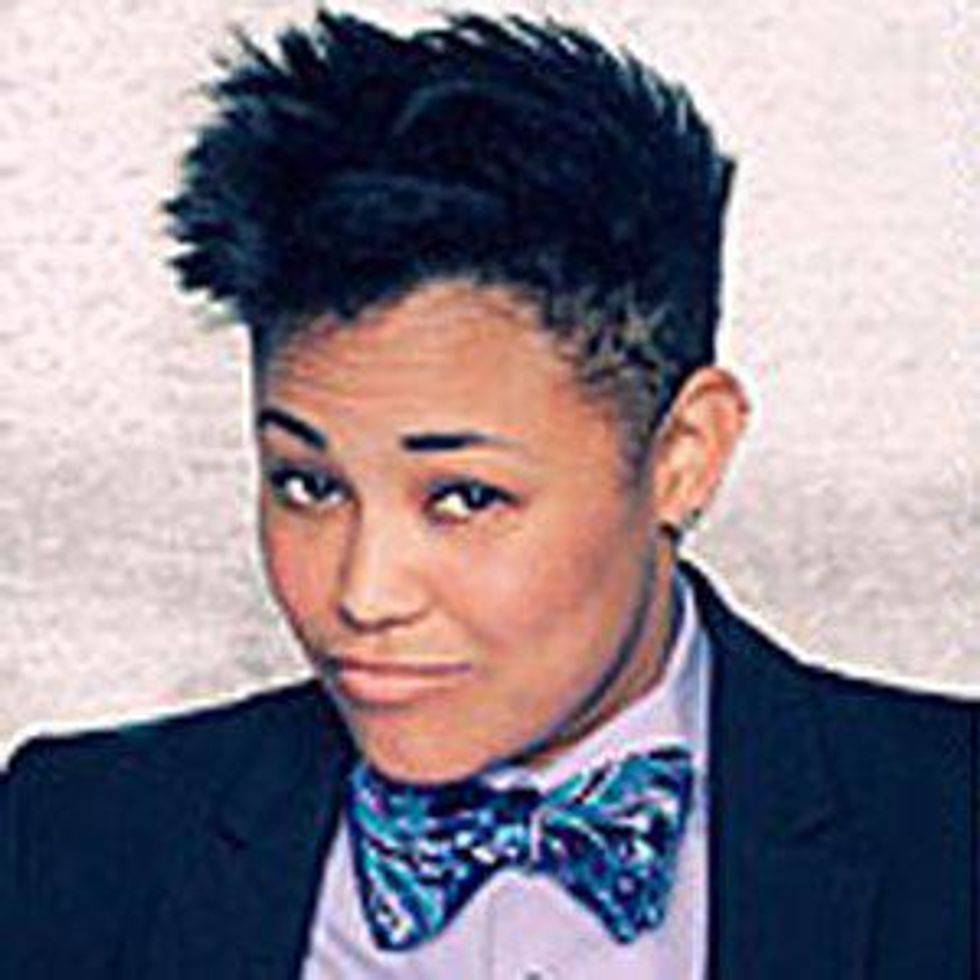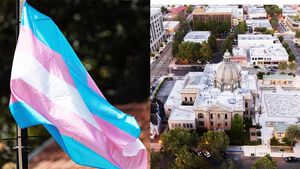In the company of lesbians of my generation and older, I frequently hear conversation about how much things have changed since we were young. And invariably, someone asks: Where have all the butches gone?
The question is driven in part by nostalgia, and in part by discomfort with what seems to have been a shift in the way young lesbians think about gender.
And the first question often leads to others: Why are all the butches becoming men? Why can’t they understand that gender is a social construct, and that women don’t have to conform to a feminine ideal? Isn’t that what we were fighting for — a world in which women could wear tool belts and neckties and do anything we damn well please, without the constraints of gender?
At its very core, this was the vision of the feminist movement, and lesbians more than anyone understood how transformative this could be.
Years ago, I asked the same questions, but today, this conversation makes me uncomfortable. Because I am of this older generation, I have seen things change — and not change — for a long time.
I have, in my life, loved many butches. My relationships and affairs have almost always been with masculine women and, more recently, with trans men as well.
In my experience, for as long as I have found myself in intimate circumstances with butches/studs/masculine-identified women — from way back when I was too young to be in the bars where I was meeting and going home with them — a curious thing happens. Once there is enough trust established, I become witness to a moment of confession. The confession goes something like this: "I don’t know how to explain this, but I don’t exactly feel like a woman. I mean, I’m butch, and that’s close, but honestly, I’m not sure what I am."
Don’t get me wrong, there are many, many proud butch women who are exactly that: women. In today’s terminology, their gender expression is masculine, and their gender identity is female. They wear their tool belts proudly, and I am happy to admire the show. For them, a butch identity resolves the issue — if people have a problem with it, it’s their sexism or homophobia rearing its head.
But that experience is not everyone’s, and it never has been. Butches may look a lot alike on the outside, but they aren’t the same on the inside.
In the mid 1990s, as a grad student, I wrote about the lesbian history of Detroit. I interviewed 48 women who had lived as lesbians between 1930 and 1970. When I met them, these women were mostly in their sixties and seventies. Of the 48, four — almost 10% — said that if they were young today, they would transition their gender and become men.
This didn’t surprise me, really, because of all those late-night confessions I’d already heard. I knew that for many, "butch" was the closest they could come to a word that would describe the experience of being a masculine person in a woman’s body. But for these folks, while "butch" was better than "woman" or “lesbian,” it still fell short. You’ve probably heard butches who say that they don’t use the term "butch lesbian," but prefer simply "butch." This isn’t a denial of sexual orientation, but a claiming of a complicated gender identity.
One of the mistakes that we made as lesbian feminists is that we combined sexual orientation and gender expression into an androgynous dyke ideal: short hair, no makeup, able to fix a car or bake bread with equal ease, frequently accused of being in the wrong public restroom (much to our outrage).
How did you know you were a lesbian? You got thrown out of Girl Scouts and hated Barbie, and never felt comfortable in a dress and heels. But as well-intentioned as we may have been, plenty of lesbians never fit that ideal. Not just trans men but also lesbians like me, who pored over Glamour magazine and loved anything that sparkled. The orientation fit, but my attempts at correct dyke behavior were a miserable failure.
In short, the gender of who we love has always been a separate question from our own gender expression, and our attempt to consolidate gender identity and expression with sexual orientation has led us to a fundamental misunderstanding of the trans experience.
Images in this article are from an exhibition, "GayFace", a collection of works by New York City photographer and artist Ashley Kolodner (pictured above). For more on Kolodner's work see this portfolio on our sister site Advocate.com, and Kolodner's site.
When lesbians ask where the butches have gone, what we’re saying is that we don’t understand trans men. We are stuck on three core beliefs:
For many of us, particularly of an older generation, being out and proud lesbians and feminists has been our life’s journey — and hard won. The communities that we’ve built as a shelter from the storm of a misogynist culture are particularly dear. As one close friend said to me, "I love being a woman so much that I can’t imagine giving that up." And the idea of becoming a man — with all the unearned, unexamined privilege that the idea suggests — is especially incomprehensible; it’s a betrayal of trust.
Others believe that choosing to transition from being butch to being a man shows a lack of courage or imagination, that somehow the person wasn’t brave enough to be a butch woman.
Still others think we’ve failed as a community to create a space in which any woman can dress and act as she pleases. That was my first reaction to those Detroit butches and studs: that the times were so hard that it had made them long for escape. I wondered if, had they been born a generation later, they might have found support in lesbian feminist communities that they were lacking in the rough-and-tumble bar culture that was their only refuge.
But I have since learned that transition is not a betrayal, a lack of courage, or a desire to escape a unwelcoming community. That’s what these Detroit butches and studs taught me. They lived their lives with enormous heart and against all odds. They were the bravest people I knew. They were the survivors, as street-smart and as proud as anyone I’d met in lesbian feminist circles. I simply couldn’t believe they didn’t have the guts or the vision to live fully as who they were.
And so I came to a different understanding. I now believe that all of the battles we fought and the work that we did has created a community where women can be our true selves to a far greater degree, in every aspect of our lives. And in doing that, we’ve made a space where it’s okay to try out different forms of gender expression, from super-femme to androgynous to butch. That has been incredibly freeing for most of us.
But for some, the hard-won space and freedom to try out different forms of gender expression has confirmed what they knew deep down: that fundamentally, they’re not women at all. And they know that because they’ve had the space and the freedom to be butch, and it still wasn’t the right fit.
Most trans men I know came out as lesbians, then claimed a butch identity, and then transitioned. Some of them have realized they never were attracted to women at all and are now gay men — this isn’t as odd as it might sound, if you accept that the lesbian community is the only safe space to explore gender, so it’s where many trans men start their journey.
Maybe that’s why lesbians feel we’ve lost them: because we believed they were ours.
Transgender people are figuring out how to change what is arguably a person’s deepest identity, the one we are most identified with from birth. The challenges, both in terms of navigating one’s own changing body and the outside world, are staggering, even in the most supportive communities. To make such a decision is like jumping off a cliff with little idea what lies below, but knowing that not to make the leap is another type of agony. This courage deserves our respect and our support.
So where have all the butches gone? They’re still around, although some of them go by other names. Some are still proud butches and studs; others, particularly young people, prefer the term "genderqueer," with endless subcategories that underscore that gender identity and expression may intersect with sexual orientation but aren’t subsumed by it. They’ve come to understand that gender-variant people may fall across a wide span of femininity and masculinity, but what they have in common is the experience of falling outside of society’s expectations of their gender.
At the core of this experience is enormous creativity and an analysis of gender as a social construct that got its start in lesbian feminism and gay liberation. All our work isn’t forgotten; it has been built upon by a new generation seeking to be true to themselves, just as we dreamed they would.
***
An activist for social justice for over 25 years, Roey Thorpe has served as the executive director of Basic Rights Oregon, as well as Planned Parenthood Advocates of Oregon. She is currently the director of strategic projects for the Equality Federation, and lives in Portland, Ore.
Thorpe was elected as a city councilwoman and acting mayor of Ithaca, New York. She was selected as one of Portland's 50 Most Powerful Women in 2004, and has been a recipient of the Ann Shepherd Award, the Fighting Spirit Award, and the HRC Equality Award. Thorpe conducted an oral history project, and has published articles about the history of lesbians in Detroit in the 1930s to the 1960s, as well as personal history and political commentary for a variety of publications.
In her spare time, Thorpe is a serious recreational poker player, always on the lookout for the next big game.
***
Images in this article are from an exhibition, "GayFace", a collection of works by New York City photographer and artist Ashley Kolodner (pictured above). For more on Kolodner's work see this portfolio on our sister site Advocate.com, and Kolodner's site.
Follow SheWired on Twitter.
Like SheWired on Facebook.































































































































